San
Diego Jewish World
Wednesday Evening ,
August 1, 2007—Thursday, August 2, 2007
Vol. 1, Number
93
|
Archives Event Tracker HOME Jewish Directory Jewish Grapevine Jews in the News News Sleuths Sports |
| PLEASE SUPPORT OUR ADVERTISERS; THEY ARE HELPING TO BRING San Diego Jewish World TO YOU: America's Vacation Center Bubbla Packaging Systems I'm There For You Baby radio show In the Know' radio show JCC Maccabi games Jewish American Chamber of Commerce Jewish Community Foundation Journey to the copper age Old Town Trolley Tours of San Diego Seacrest Village Retirement Communities |
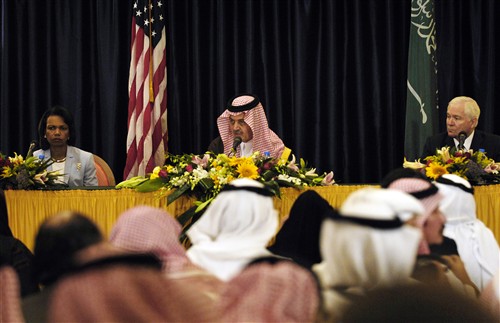
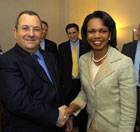
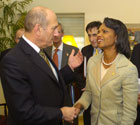


PUBLIC DIPLOMACY—Left, Saudi Foreign Minister Saud al Faisal is
bracketed at a news conference by U.S. Secretary of State Condoleezza Rice
and Secretary of Defense Robert Gates in Jeddah; Later in the day, Rice flw to
Jerusalem where she met, among others, Israel's Defense Minister (and former
Prime Minister Ehud Barak) and Prime Minister Ehud Olmert. The Director
Generals of Israel's and Sri Lanka's Foreign Ministries, Aaron Abramovich and
Palitha Kohona, wrapped up a four-day consultation in Israel. In
Washington DC recently, San Diego area AIPAC chair Leslie Caspi met with
Congressman Bob Filner.
Photo credits (1) U.S. Defense Department; (2-3) U.S. State Department; (4)
Israel's Ministry of Foreign Affairs; 5) Office of Congressman Bob Filner
|
San Diego Jewish World—August
1, 2007 |
Rice in Israel: 'We are not going to abandon the people of Gaza to Hamas' JERUSALEM—Israe’s Foreign Minister Tzipi Livni and U.S. Secretary of State Condoleezza Rice met the news media together after Rice’s arrive in Jerusalem. Here is a transcript of that meeting as provided by the U.S. State Department: FOREIGN MINISTER LIVNI: Hello. Thank you. I would like to warmly welcome Secretary Rice to the region and to Israel. Well, there's never a dull moment in the region, but this is really a crucial point in time, I mean, throughout the threats coming from the extremists, Iran, Hezbollah, Hamas. But there is a government, a Palestinian government which meets the requirements of the international community, a government that believes in the vision of two states, a government that shows determination to change the situation.
And Israel is not
going to miss this opportunity. We are not going to miss the opportunity to
promote a dialogue with Mahmoud Abbas and the Palestinian government, a dialogue
that can represent the widest common denominator between Israel and the
Palestinians with, of course, significant political substance. This is the idea
and of course, the implementation will be in accordance to the ability of the
Palestinian government to control and its ability, of course, to fulfill its
obligations, especially when it comes to Israel security. |
|
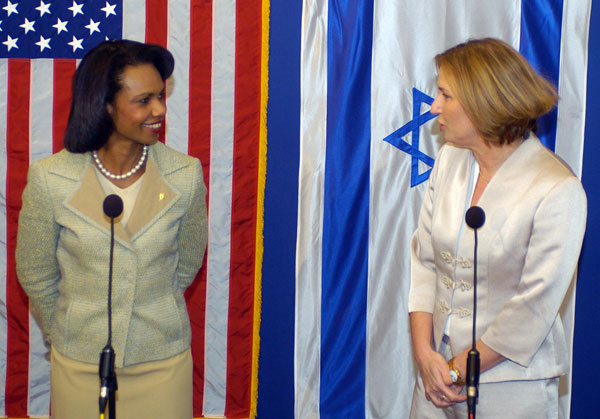
Against backdrops of the flags of their
nations, U.S. Secretary of State Condoleezza Rice and Israel's
Foreign Minister Tzipi Livni meet the international news media—State Department
photo
time when
the United States wants to take advantage of potential opportunities to advance
a two-state solution. It is, after all, the only way (inaudible) between Israel
and its neighbors to also press for bilateral progress between Palestinians and
Israelis and also so that Israel can have a horizon with the Arab world. We
think that both are very important.
We will talk about a variety of issues. We will also, of course, talk about regional issues. I've just had widespread discussions about the regional circumstances here, the various threats and opportunities and I'm sure that we'll have a chance to talk about that too. So thank you (inaudible).
QUESTION: Madame Secretary, is it final? Will Saudi Arabia participate in the full meeting and did the Saudis have any position to do so, like discussing the core issues of final status agreement?
SECRETARY RICE: Thank you. Well, I was not issuing invitations on this trip and it wasn't the time to (inaudible) about the role that this international meeting can play in supporting the bilateral discussions between the Israelis and the Palestinians and, as the President said, in laying the groundwork for the negotiations that can lead to a Palestinian state.
And so I've got
lots of good ideas and input. I was encouraged by the attitude that I have seen
here among all of the parties about the prospects for this international
meeting, but I think it's too early, first of all, to enter -- to issue
invitations. It's certainly too early to expect people to say whether they will
attend, but I was very encouraged by what I've heard throughout this trip.
(Jump to
continuation)
(Return to top)
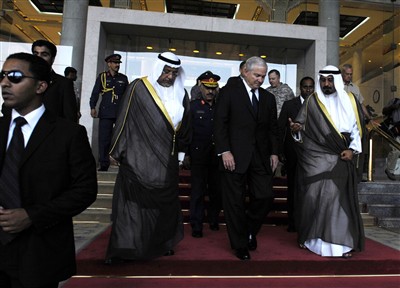
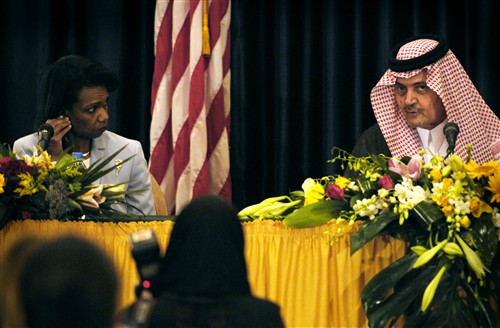
U.S. Secretary of Defense Robert Gates
is escorted down red carpet in Kuwait; Secretary of State
Condoleezza Rice listens to a translation of Saud al Faisal's answer
at a press conference in Jeddah.
U.S. Defense Department photos
'Substantive'
Israeli-Palestinian conference would be likely to attract serious interest from
Saudis
(Editor's Note: Before flying to Jerusalem, U.S. Secretary of State Condoleezza
Rice and Defense Secretary Robert Gates met in Jeddah with Saudi Arabia's
Foreign Minister Saud al Faysal. The latter explained under what
conditions Saudi Arabia would participate in the international meeting on the
Palestinian-Israel conflict proposed by U.S. President George W. Bush)
FOREIGN MINISTER SAUD: (In Arabic) In the name of God the Almighty, I am glad to welcome Dr. Condoleezza Rice the U.S. Secretary of State and Secretary of Defense Mr. Robert Gates. The two Secretaries have met with the Custodian of the two Holy Mosques (King Abdullah) and we have had talks about the Palestinian-Israeli conflict, the peace process in the region, the situation in Iraq, the crisis in Lebanon, the issue of nuclear weapons in the area, and the general disturbances in the region in general.
We have listed to Dr. Rice’s explanation about the international peace conference and we think the initiative includes several positive solutions for a sustainable Palestinian state, dismantling settlements, and solving the problems of Palestinian refugees. These elements are in the Arab initiative for peace.
The Custodian of the Two Holy Mosques (King Abdullah) has stressed the importance of solving the Palestinian-Israeli conflict, which could solve several tensions in the region. The Arabs have expressed their desire to arrive at a solution to the conflict and discuss the final solution directly. There is an international push to solve the issue. Israel must prove its seriousness in dealing with these efforts by taking concrete steps away from political maneuvering and has to work effectively away from (unintelligible).
We also discussed Iraq and the recent events there, and we expressed our concern at the goings-on and the instability of its political situation, especially since the incidents in Iraq are not confined to its people, but to the stability of the region in general.
The Kingdom is keen on achieving peace in Iraq and maintaining its unity and stability. However, the success of these efforts are [sic] tied to achieving social stability, equality, and representation for all of Iraq’s people and all of the ethnic and religious groups there. Iraq bears a responsibility to (unintelligible). This issue has been discussed at the conference held in Sharm el-Sheikh. There was an agreement to a plan, and we are looking forward to seeing the effects of these efforts and what has happened on the ground.
We have also discussed the Lebanese issue and the situation of tension, especially (unintelligible). We call upon our Lebanese brethren to respond to these efforts and listen to the sound of reason, and put their national interests first.
We also discussed the proliferation of nuclear weapons and weapons of mass destruction. We confirm that we will solve the existing struggle through diplomacy without escalating tension.
Also, during the talks we discussed the security cooperation between the two countries (U.S. and Saudi Arabia) that has continued for six decades. It is important to continue and enhance this cooperation.
In terms of countering terrorism, we are pleased with the positive results which have come about through our joint cooperation.
In general, the talks were effective, positive, and frank, as they always are.
SECRETARY RICE: Thank you very much, Your Royal Highness. And thank you very much for welcoming us here. We have had a series of very good discussions and I would especially like to thank His Majesty for all of the time that he gave to us last night and the time that we’ve been able to spend with you.
(Jump to continuation)
(Return to top)
U.S. House adopts bill authorizing states and
local governments to pass Iran divestment laws
WASHINGTON, DC (Press
Release)—The
House on Tuesday passed legislation by a vote of 408-6 that authorizes state and
local governments to divest from companies investing in Iran's petroleum and
natural gas sector and protects fund managers who divest from such companies
from potential lawsuits.
The passage of the bill comes as states around the country, including Florida,
California, Ohio, Illinois, Texas, New York and New Jersey, are mounting efforts
to divest their pension funds from companies investing in Iran's petroleum
sector or conducting business with its defense or nuclear sectors. The
legislation was introduced by Reps. Barney Frank (Democrat, Massachusetts) and
Christopher Shays (Republican, Connecticut).
The preceding story was provided by the American
Israel Public Affairs Committee
(Return to top)

House unit passes bill
affirming Lebanese
sovereignty and U.S. aid to resist overthrow
WASHINGTON, DC (Press Release) — Rep.
Gary Ackerman (Democrat, New York) announced on Tuesday that the House Foreign
Affairs Committee unanimously approved his resolution in support of Lebanon.
Ackerman, the chairman of the House Subcommittee on the Middle East and South
Asia, hailed the event as an important signal of Congressional support for
Lebanon, and said that he expects today's step to be reinforced by adoption of
the measure by the whole House in September.
"What's been happening in Lebanon is aggression in the classic sense of the word" Ackerman said. "Through a campaign of assassinations targeting Lebanese parliamentarians, rioting and demonstrations, bombings in public places, threats to establish an alternative extra-constitutional government, and the instigation of a jihadi insurgency, Syria, Iran and Hezbollah are on the cusp of bringing down Lebanon's government. Now is the time for Congress to send a strong message of support for the democratically elected and fully legitimate government in Lebanon."
Ackerman's resolution (H. Res. 548) slams Hezbollah and other pro-Syrian groups’ attempts to undermine and intimidate the Lebanese government, and condemns Syria and Iran for continuing to illegally smuggle arms into Lebanon. The resolution also condemns the assassination campaign against Lebanese parliamentarians and public figures who oppose Syrian interference in Lebanon, and affirms U.S. support for the Special Tribunal for Lebanon established to bring to justice those responsible for the bombing that killed former Lebanese Prime Minister Rafik Hariri. Finally, the resolution urges the Government of Lebanon to request UNIFIL’s assistance to secure the Lebanese-Syrian border and re-affirms the intent of Congress to provide financial and material assistance to support the sovereignty, territorial integrity, unity, and political independence of Lebanon.
The preceding story was provided by the office of Congressman Gary Ackerman(Return to top)


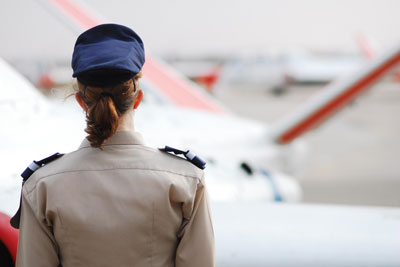
IDF photos by Abir Sultan and Dan Bronfeld
Israeli women accepting IDF combat roles
By Bar
Ben-Ari
HEBRON, West Bank—A year has passed since the last war in Lebanon, and the
stories of the combatants who crossed the border are still often mentioned.
The media in Israel and worldwide broadcasted the many stories of bravery
and wonder, and the trying experiences soldiers went through when deep into
Lebanese territory. For the majority of them, it was the first time they had
set foot on Lebanese land. It was their baptism by fire, in more ways than
one, which became more and more a part of their daily routine as time
passed. "No, you don't ever get accustomed to it," says Corporal May Inbar,
then 19 years old, a medic during the war. "But at a certain stage you learn
how to differentiate between our fire and theirs, like music. And when a
bomb hits near by-as though fear ceases to exist, everything is gone. I
think neither about the Katyushas, nor about the danger. I just see the
wounded soldier bleeding in front of me, and at that moment I know what to
do."
R', an airborne medic in the 669 Air Force elite unit noted a short while after the war ended: "If you asked me two months ago, I would not have believed that we could reach such extreme situations. In my opinion, nobody thought that girls would go in." R's team was the first to evacuate the "Yasur" helicopter which crashed on its way back to Israeli territory. "You go in, to the same area which had been struck by an anti-tank missile barely seconds ago. The feeling is crazy-you don't know if your friends were in the helicopter, but one thing is for sure-we never leave wounded soldiers behind," she concludes. "It is a terrible feeling. I cannot even imagine how something like that could happen."
The warfare in Lebanon was a defining period for both men and women, as it was the first time (since the War of Independence) that women held central positions in field units alongside men: In regular service, professional service, and in reserve duty. Among the 119 soldiers who gave their lives in the war, there was one female. She was Sergeant First Class (res.) Keren Tendler, of blessed memory, an airborne engineer in the 'Yasur" helicopter alignment, who was in charge of the team on the helicopter that crashed.
Fourteen percent of the women who were called for reserve duty were in combat positions. Most of them were medics. "We really are not different," declares R', explaining: "If a helicopter crashes, we both have to perform the same tasks, quickly and professionally, and it does not matter who is a male and who is a female. They allowed me to go in and fulfill my purpose- and that is a really great feeling." Alongside the intense fighting in Lebanon, in a different spot on the Israeli border, the female combat soldiers of the Military Police "Sahlav" unit patrol around the Jewish community in the city of Hebron. "We frequently get responses from people who are not accustomed to seeing women in Hebron. They are not used to seeing a woman with a helmet and a ceramic vest, who is carrying a weapon," says Orli bar-Levi, a combatant in the battalion. Despite the tendency of soldiers from other battalions to blink in disbelief at seeing the girls manning the post, says Bar-Levi, they showed respect and utter trust in them.
Light infantry? No, Karakal!
The most difficult times for the female combat soldiers of the Karakal
infantry battalion is when they execute missions in the field, which can
take up to 72 hours. In the field, they remind us, there are no showers or
other amenities. Those are all replaced by difficult challenges and
longings. When I ask the obvious question of why choose this over a desk job
in an air-conditioned office, Lieutenant Brit Kortzki looks at me straight
in the face and answers: "For the difficulty of the work, and I am proud to
say it. I remember when I sat on my father's lap and listened to his stories
about the coldest cold, the hottest heat, the most painful pain, and his
friends- today that is part of my daily routine."
(Jump to
continuation)
.
Shoah survivors call $22 monthly increase
'disgraceful'
JERUSALEM (Press Release)—Holocaust survivors in Israel have protested against
the government’s proposed top-up pension that would add 83 shekels (US$ 22) to
the monthly incomes of survivors aged over 70.
The scheme, announced earlier this week, is meant to supplement an existing
old-age pension and national insurance program, but survivors' advocacy groups
say the new stipend was a disgrace to the 120,000 survivors who would benefit
from it.
"It is saddening and insulting to discover that Israel prefers a biological
solution for the plight of Holocaust survivors," Noach Flug, who heads an
umbrella organization of survivors' advocacy groups, told the newspaper
Ha'aretz. However, Israel’s prime minister Ehud Olmert said the scheme would
go part of the way toward redressing ambivalence in Israeli society towards the
survivors of the Nazi death camps and eastern European ghettos.
"Holocaust survivors living in Israel are entitled to live respectably, without
reaching a situation in which it is beyond their means to enjoy a hot meal. The
neglect of successive governments will not continue. It is important to see to
it that Holocaust survivors receive these supplements and are able to live
honorably," Olmert said.
The preceding story was provided by the World
Jewish Congress
Wiesenthal Center
protests Danish
decision
on award to Holocaust denier Erik Haaest
LOS ANGELES (Press Release)—The
Simon Wiesenthal Center denounced today’s statement by the Danish
Ministry of Culture supporting a grant for a WWII history project by
Erik Haaest, a longtime Holocaust denier, as “repugnant and
shameful.”
“This is an insult to the memory of every victim of the Holocaust,
and to the brave members of the Resistance in Denmark and
elsewhere,” said Mark Weitzman, the Director of the Center’s Task
Force Against Hate, adding, “There can be no justification of state
support for Holocaust deniers.”
Weitzman also said in awarding a
grant to a Holocaust denier, the Danish government is flouting its
commitment as a member of the International Task Force on Holocaust
Education, Remembrance and Research, as well as its support of a UN
Resolution calling upon all member states to ‘Condemn without any
reservation any denial of the Holocaust.’”
“This is an insult to the memory of every victim of the Holocaust,
and to the brave members of the Resistance in Denmark and
elsewhere,” said Mark Weitzman, the Director of the Center’s Task
Force Against Hate, adding, “There can be no justification of state
support for Holocaust deniers.”
In the past Haeest, has questioned the existence of gas chambers at
Auschwitz and has reportedly called Anne Frank’s diary “a swindle.”
The Danish Ministry of Culture’s statement addressing the grant
controversy claimed an “arms-length principle,” and allowing
independent committees to award grants, a claim that Weitzman calls,
“simply an unacceptable attempt to evade any responsibility.”
Weitzman also said in awarding a grant to a Holocaust denier, the Danish government is flouting its commitment as a member of the International Task Force on Holocaust Education, Remembrance and Research, as well as its support of a UN Resolution calling upon all member states to ‘Condemn without any reservation any denial of the Holocaust.’”
I
BERLIN (Press Release)—A new exhibit on current anti-Semitic trends is to open at the German Ministry of Foreign Affairs in Berlin on Wednesday. The exhibit entitled “Anti-Semitism? Anti-Zionism? Criticism of Israel?” will be on display in the ministry’s courtyard before moving to Technical University in Berlin, and elsewhere in Germany. The exhibit, was produced by Yad Vashem and the Center for Anti-Semitism Studies at Technical University. German Foreign Office minister Gernot Erler will address Wednesday’s opening, as will Yad Vashem chairman Avner Shalev and the director of the Center for Anti-Semitism Studies, Wolfgang Benz.
Including some 45 panels, divided into thirteen chapters, the
exhibit begins with a review of the Jews’ demography and richness of
Jewish life, then has a brief history of anti-Semitism, before
focusing on current examples of anti-Jewish expressions. The exhibit
looks at current expressions of anti-Semitism in the European media,
e.g. through caricatures and photos, as well as at violence and
vandalism directed against Jews and Jewish institutions.
The preceding
story was provided by the World Jewish Congress
(Return to top)
Foreign ministries of Israel, Sri Lanka swap notes
JERUSALEM (Press Release)—Dr. Palitha Kohona, Secretary (Director General) of the Ministry of Foreign Affairs of Sri Lanka, has completed a four-day visit to Israel. Dr. Kohona was invited by Mr. Aaron Abramovich, director general of the Ministry of Foreign Affairs of Israel. During the visit Dr. Kohona met with various government agencies.
His visit was an excellent opportunity to obtain a good overview of the friendly bilateral relations between the two countries and to discuss ways to strengthen them further. Regional issues were also discussed.
In the spirit of their friendly relations, the two sides looked into issues of mutual benefit and potential areas of cooperation in fields such as high tech, agriculture and industrial development, tourism promotion, investments and exchange of students and trainees. The Israeli side conveyed its desire to cooperate in various fields of priority for Sri Lanka, through MASHAV – the Israel Foreign Ministry's Center for International Cooperation.
Both side condemned all forms of terrorism and as countries which have suffered from this menace and have a long experience with combating terrorism, they both oppose any use of terror as a political tool. The Israeli side expressed hope that the internal conflict in Sri Lanka will be solved soon through negotiations and peaceful means. Dr. Kohona conveyed his country's wish for a successful outcome of the Peace Process between Israel and the Palestinian People.
Dr. Kohona presented a formal
greeting letter from the President of Sri Lanka, H.E. Mahinda
Rajapaksa, to the new President of Israel H.E. Shimon Peres. The
Foreign Secretary also visited "Yad Vashem" the Holocaust Memorial
as well as other sights of interest in Jerusalem.
The preceding story was provided by Israel's
Ministry of Foreign Affairs
 The Jews 'Down Under' The Jews 'Down Under'By Garry Fabian |
●South Australian scandal threatens its kashrut
ADELAIDE, Australia—Kosher food made in South Australia and sold nationally and overseas have been given the all clear by rabbinic authorities, despite a major breakdown in Adelaide's kashrut supervision over the past eight years.It has been revealed that at least three kosher-approved South Australian products listed in the Kosher Australia Food Bulletin 2007 (5767-8) have been made without rabbinic oversight for extended periods.
The manufacturers of Beerenberg jams, B-D Farm yoghurt, and breads baked by Baker's Delight in Freeville South Australia, stated that the kosher supervisor Rabbi Yossi Engel had not visited their plants for between three to eight years.
Kosher Australia has been aware of the problem since last April, and kosher consumers discovered the lapses after contacting producers.
The authorities' web site contains no updates or alerts about the issue.Kosher food producers in South Australia this week sought to reassure customers that their cooking practices remain kosher, despite major lapses in rabbinic supervision dating back to 1999
· ●
JNF Australia backs land bill in KnessetMELBOURNE—The Jewish National Fund (JNF) of Australia fully supports the
proposed legislation in the Israeli Parliament that would allow it to enforce a policy of only leasing land to Jews.
The bill, which recently passed a preliminary reading in the Knesset, was approved by a 64-16 margin.
Australian JNF federal CEO, Rob Schneider said the JNF owed its mandate to previous generation of Jews who made personal sacrifices to fund Jewish land.
"It's a question of exercising ownership over land that was purchased historically by Jews for the benefit of Jews", he said.
Schneider does not anticipate a donor backlash from the controversy surrounding the Knesset bill. He anticipates JNF Australia will raise between Aust $9 and Aust $15 million in 2007.
●New president for National Council of Jewish Women-Australia
SYDNEY—At the recent NCJWA (National Council of Jewish Women Australia)
meeting held in Sydney (New South Wales) Mrs, Rysia Rozen was elected as national president for a four year term. NCJWA, which has branches in all Australian states, this year celebrates its 80th anniversary having been established in 1927.
Rosen has served as president of the Victorian state branch for several years, as well as president of the National Council of Women in Victoria, and many other community organisations, both in the Jewish and general community.
|
|
Adventures in Cruising—Royal
Caribbean's Monarch of the Seas Pier side at Los Angeles Port District Tyler, Caren and Ashlee Ford get ready to cruise Thanks to the Ford family of Agoura Hills, California, for sharing their photos of their family reunion weekend cruise |
U.N. Security Council praised for decision sending
peace-keeping troops to Darfur region of the Sudan
NEW YORK (Press Release) —The Jewish Council for Public Affairs (JCPA) urged world leaders to accelerate enforcement of UN Resolution 1769, approved Tuesday by the United Nations Security Council, that allows the deployment of 26,000 peacekeepers to Sudan's Darfur region.
Under Resolution 1769, a joint peacekeeping mission by the African Union and United Nations will replace the current force of 7,000 African Union troops on the ground in Darfur by December 31st. To date, more than 2 million people have been driven from their homes and over 200,000 have been killed in the ongoing conflict since 2003.
Lois Frank, JCPA chair, issued the following statement on Tuesday following action by the UN Security Council:
"The world has watched and done little as thousands of lives have been lost in the genocide in Darfur. Today's vote by the United Nations Security Council invoking Chapter 7 of the UN Charter, allowing the United Nations to authorize force, is a promising step toward ending the genocide in Darfur and bringing peace to the region. However, time is running out, and the JCPA implores world leaders to expedite Resolution 1769 to prevent any further loss of life."
* *
WASHINGTON, DC – In response to the United Nations Security Council’s adoption of Resolution 1769, authorizing the deployment of a hybrid United Nations – African Union peacekeeping force in Darfur, Rabbi David Saperstein, Director of the Religious Action Center of Reform Judaism, issued the following statement:
We praise the members of the United Nations Security Council for yesterday’s unanimous passage of Resolution 1769 and hope this resolution results in the rapid deployment of a hybrid UN-African Union peacekeeping force to Darfur. The additional 26,000 military personnel and police officers authorized in Resolution 1769 are necessary to ensure that civilians are protected and the genocidal activity in the region ceases. The people of Darfur have waited long enough for the world to offer them more than empty promises and condemnations; too many have lost their possessions, their homes, and their lives. We must make certain that this resolution results in swift action and we strongly urge world leaders to use their nation’s resources to bring peace to this troubled region. Yesterday’s resolution is a promising step, but our efforts must continue until the people of Darfur are safe and the atrocities in the region have ended."
NCJW applauds passage of bill fighting
pay discrimination against women
WASHINGTON, DC (Press Release)—The National Council of Jewish Women (NCJW) today applauded passage by the House of Representatives of the "Lilly Ledbetter Fair Pay Act of 2007," designed to reverse the recent 5-4 Supreme Court ruling that made it harder to recover damages for wage discrimination. NCJW President Phyllis Snyder released the following statement:
"NCJW is
extremely gratified to see the House of Representatives take a major
step to undo the damage done by the Supreme Court in Ledbetter v.
Goodyear when the court limited the ability of victims of wage
discrimination to obtain damages in cases where the discrimination was
hidden but longstanding. Lilly Ledbetter, the plaintiff in that case,
and all the other victims of discrimination over the decades, deserve to
be compensated in full for the losses they have suffered in every
paycheck. The House vote of 225-199 is a resounding endorsement of
fundamental fairness. We urge the Senate to follow suit.
"The President has said he will veto this bill. That would be a
contradiction of his stated commitment to equal rights for all. We
strongly urge him to reconsider. Our government must keep faith with
those who expect to be protected from unlawful discrimination. The
President should lead the way."
NCJW is a volunteer organization, inspired by Jewish values, that works to improve the quality of life for women, children, and families and to ensure individual rights and freedoms for all through its network of 90,000 members, supporters, and volunteers nationwide.
The preceding article was provided by the National Council of Jewish Women
(Return to top)
Education Committee names Yarmuth as
'Outstanding New Member' of the Congress
WASHINGTON,
DC (Press Release)—The Committee for Education Funding (CEF), a
nonprofit and nonpartisan coalition of over 100 organizations reflecting
the broad spectrum of the education community, announced today that they
will honor Congressman John Yarmuth (Democrat, Kentucky) with the
“Outstanding New Member” award for 2007.
“During this 110th Congress, first year Representative John Yarmuth
clearly distinguished himself as an advocate for education funding and
we are proud to recognize him,” said Ed Kealy, Executive Director of the
Committee for Education Funding.
Yarmuth introduced several key education measures in his first seven
months, including:
●The Striving Readers Act, which the First Lady endorsed as a key way to promote teenage literacy.
●An amendment to the College Cost Reduction Act that offers $1,000 a year in loan forgiveness for public servants.
●The reauthorization and expansion of Even Start.
●The
Empowering Children with Autism through Education Act to guarantee a top
notch education for students affected with autism.
Yarmuth has a number of other education programs in the works and has
been instrumental in the reform of No Child Left Behind.
“CEF and its member organizations do an excellent job leading the way on
the education issues facing this country, and I am honored that they are
pleased with my work so far,” Yarmuth said. “We’ve got a lot more ahead
of us, and I look forward to continuing to do all that I can to ensure
that every American child has access to a quality education.”
CEF will also honor former Presidents Bill Clinton and George H.W. Bush
with “Charles Wilson Lee Distinguished Citizen Awards” for their
commitment to education in the years since they left office.
CEF will present the awards at its annual gala, September 20 in
Washington.
The preceding story was provided by the office of Congressman John Yarmuth
 Jews
in the News Jews
in the News
-------------------------------------------------------------------------------------------------------- Like you, we're pleased when members of our community are praiseworthy, and are disappointed when they are blameworthy. Whether it's good news or bad news, we'll try to keep track of what's being said in general media about our fellow Jews. Our news spotters are Dan Brin in Los Angeles, Donald H. Harrison in San Diego, and you. Wherever you are, if you see a story of interest, please send a summary and link to us at sdheritage@cox.net and we'll acknowledge your tip at the end of the column. Internet problems prevented us from obtaining links to SignonSanDiego, which is our normal practice. |
*Lynne Elson
of Rancho Bernardo,
California, is back from a trip to the village of Nabagoye,
Uganda, where she taught Hebrew to a group of school children
belonging to the Abayudaya Jewish community. The story by
Yuxing
Zheng
is in
today's San Diego Union-Tribune.
*Israel's
Prime Minister Ehud Olmert said that Israel is ready to
hand over responsibility for security on the West Bank to the
government of Palestinian President Mahmoud Abbas provided
sufficient assurances for Israel's security and Hamas is not
permitted to become involved. Aluf Benn has the
story
on the Ha'aretz website.
*Gloria Penner's "Full Focus" news show has been
cancelled by KPBS-TV, as has the KPBS radio program "A Way With
Words." Although some people involved with the two shows now are
jobless, the venerable Penner survives. Scott Lewis of
Voice of San Diego has the
story.
*Harry Maxwell Rady,
40,
has pleaded
guilty in San Diego federal court to charges of purchasing
$10,000 worth of weapons from an unlicensed gun dealer. A story
by Will Carless is in today's Voice of San Diego. Another story
by Greg Moran, reporting that he purchased the weapons after his
parents, philanthropists Ernest and Evelyn Rady were tied up
during a home invasion robbery, appeared in today's San Diego
Union-Tribune.
________________________

Click the ad above to go to the "I'm there for you baby" website
|
|
Date: August 1, 2007
Place: U.S. State Department
Spokesman: Tom Casey, Deputy Spokesman
Subjects: Saudi Arms Sale
QUESTION:
This morning, Senator Obama has come out; he's saying that
troops should be redeployed from Iraq over to Afghanistan
and if need be, into Pakistan up in the northwestern
territories. Is this just plain campaign rhetoric? And also,
is the statement by Senator -- former Senator John Edwards
applicable when he is casting doubt about the modernization
of arms shipments to moderate Arab countries, what the
Secretary spoke about yesterday?
MR. CASEY: Joel, I think first of all, I'll try and stay as far away from U.S. presidential politics as I can and I'm glad you've been following their comments. I honestly haven't seen either the remarks you're referring to by Senator Obama or by former Senator Edwards. What I can tell you is in terms of -- first of all, let's talk about the arms sale questions. This is something that, again, I think I want to reiterate and that the Secretary's made clear is that these sales of arms, this defensive cooperation arrangement with the Gulf states, with Egypt, as well as with Israel, are matters of long standing. Our history of support and cooperation on military issues with these countries goes back decades.
And frankly, what this initiative that's been announced does is simply, at a time when agreements with Israel and Egypt were coming to an end, reassure those countries that the U.S. remains committed to their security and their safety in an environment that is changing in the Middle East and to the Gulf countries; again, demonstrates that for those countries that are standing on the side of moderation -- that do, for example, want to see a whole unified and secure Iraq, that do want to see peace between Israelis and Palestinians based on a negotiated two-state solution -- that the United States is going to continue to be there with them, to partner with them, to ensure that their defensive security needs are met.
And I also think if you look, for example, at the comments made by the Saudi Foreign Minister today -- in which he was very positive about the initiative that the President's called for, including the idea of holding a international meeting later this fall to discuss how we can all work together to move forward on Israeli-Palestinian issues -- or the comments he also made about his desire to see Iraq be successful and the fact that Saudi Arabia is now sending a delegation to Iraq on re-establishing normal diplomatic relations between those countries and that he has also been speaking with Iraqi officials about doing more on controlling the border, it's pretty clear that, in this case, Saudi Arabia, but also the other countries of the Gulf Cooperation Council, are working in a positive way for a positive solution to the region's problems. And we want to continue to work with them. So that's definitely what you should see this military assistance package as being part of.
In terms of Iraq and in terms of issues related to our troops there and our service there, I think you've heard from our officials on the ground there -- from General Petraeus, from General Odierno, from Ambassador Crocker -- about what we think the consequences would be of a precipitous withdrawal of American troops. And I think you've seen things recently written by those who certainly aren't in any way, shape or form associated with this administration, including the op-ed the other day by Ken Pollack and Michael O'Hanlon, who recently returned, talking about the fact that the President's strategy in the surge is, in their mind, appearing to make some real strides forward.
And so, certainly, we'll all have an opportunity to talk about and debate this issue. General Petraeus and Ambassador Crocker, are, of course, in the process of looking at the situation and will be presenting a report to Congress in September for their review. And I'm sure there'll be a very healthy discussion about that, not only with Senator Obama, but with all the members of the Senate and House on this and that's as it should be. This is an incredibly important issue for the United States and it's fundamental to our national security. And certainly, there are going to be a lot of different views shared. But I think the Administration right now has put forward a fairly clear course and it's one that's appearing to have some payoffs.
And I think that's a "thank you".
QUESTION: Thank you.
MR. CASEY:
Thank you, guys.
The Jewish Grapevine

|
CYBER-REFERRALS—Jay
Jacobson
alerts us to
a piece by Matthew Levitt and Jake Lipton of the Washington
Institute for Near East Policy on the financial ties between
Iran and Hezbollah in the conduct of terror operations...
Bruce Kesler
noted a report on a Christian site, Gateway Pundit, that an
unnamed Hezbollah officer said his group would have given up in
the Lebanese War if international authorities had not intervened
to force Israel into a ceasefire. Here is
the link. ...
IN MEMORY—Charmaine Kaplan, 67, who along with her
husband Maurice was an important financial supporter of
the arts in San Diego, has died. Her obituary was in
today's
San Diego Union-Tribune....
The funeral for Freda
Beitner will be held at 1 pm on Thursday, August 2, at
Greenwood Cemetery (not at 10:30 as previously indicated).
POLITICAL WHIRL—San Diego area AIPAC chair
Leslie Caspi
recently was in Washington D.C. to meet with members of
Congress. U.S. Rep. Bob Filner (Democrat,
California) sent along a photo to show that they had the chance
to talk. Caspi said she thanked him for voting for the
foreign aid bill, which included an appropriation for Israel,
and also asked him to support measures to discourage Iran from
developing nuclear weapons. ...
San Diego Jewish World—July
proved to be a month of continued growth for San
Diego Jewish World
as the following statistics by the independent Webalizer company
demonstrate. According to this chart, 25,355 different
sites connected with us during the month, averaging 3,213 visits
per day. The number of pages accessed was just about
double the number of visitors indicating that most people enter
our site on our home page then navigate to the daily news
report. Our growth in visitors has been steady since the
online publication's start up on May 1: We went from a
daily average of 2,308 in May, to a daily average of 2,898 in
June to a daily average of 3,213 in July. Our total number
of visits in July was 99,606—just short of 100,000. For
those of you who are thinking of purchasing advertising, that
means if you had an ad that ran all through July you would have
received close to 100,000 impressions. If you are with a
non-profit agency, you could have purchased that exposure at $10
per day or $310 for the month. If you are with a private
company, you could have purchased that at $20 per day or $620
per month. If you are trying to reach people with a deep
interest in Jewish affairs, our site is the place for you to
advertise! To all you readers, who keep coming back to
San Diego Jewish World,
we thank you for your patronage!
| Summary by Month | ||||||||||
|---|---|---|---|---|---|---|---|---|---|---|
| Month | Daily Avg | Monthly Totals | ||||||||
| Hits | Files | Pages | Visits | Sites | KBytes | Visits | Pages | Files | Hits | |
| Jul 2007 | 15614 | 9843 | 6390 | 3213 | 25355 | 26877941 | 99606 | 198117 | 305150 | 484050 |
| Jun 2007 | 12654 | 8368 | 5562 | 2898 | 23615 | 21458182 | 86952 | 166889 | 251044 | 379621 |
| May 2007 | 11898 | 8234 | 4457 | 2308 | 25605 | 21268566 | 71566 | 138168 | 255265 | 368855 |

COWLES MOUNTAIN BLAZE—No
one likes a "hot time" on the dance floor better than Eric Sands, who
serves
as disk jockey at a high percentage of the bar/bat mitzvahs in San Diego.
But when fire threatened his home
near Cowles Mountain in Mission Trails Regional Park today, Sands was glad for
the fire department cooling
thngs off. He shot this photograph.
| The Greene Line Norman Greene |
SAN DIEGO—July 31st was an anniversary, not a joyous occasion. Five years ago to the day, Marla Bennett was murdered by Arab extremists in the Frank Sinatra Cafeteria at Hebrew University in Jerusalem.
It’s hard to believe that five years have passed since that tragedy occurred when Marla was taken by the senseless, vicious act of a terrorist who planted a bomb aimed at killing students.
For her parents, Michael and Linda, life has gone on as they have sought to extend the memory of their youngest child. They do not want the world to forget that bright eyed Marla lived and made her mark on society even in the shortness of her 24 four years of life. In the ensuing five years’ Marla’s life glow has endured in the acts of individuals and organizations around the world.
In addition to naming a chapter of Magen David Adom after Marla, there are memorial gardens at Berkeley, at a Jewish Youth Camp in Malibu, at Hebrew University, at Shar HaNegev in Israel and a stained glass window at a Jerusalem synagogue. The San Diego Jewish Academy has established a Marla Bennett annual "kindness" award and in her name there is a life saving ambulance donated to Magen David Adom, a van for troubled street kids in Israel and a new cabin at Paul Newman’s Hole-in-the-Wall-Gang Camp for ill children in the Jordan River Village in Israel.
There are also two funds that aid youth education. One fund carries Marla’s name to assist youth traveling to Israel and another fund was established to assist with Jewish and non-Jewish charities in California and Israel.
Each year, the San Diego Jewish Film Festival has screened a movie in Marla’s memory. And this past Passover, a new Hagadah was published in her honor as well.
All these tributes honor Marla’s memory in ways that reflect her character and personality.
By any standard, Marla was special. She was gifted intellectually. She was an incurable optimist and a generous activist. She wanted to do it all. To learn, to study, to perfect her understanding of Judaism and the world around her and to do good deeds. She wanted to be a Jewish educator to pass on her heritage to future generations.
She was an ardent believer in the goodness of man, the role of Israel among the nations, the bright future for world peace. To be with Marla, was to be in the company of a sweet, slightly mischievous, charming young woman who listened and who really cared. She radiated vitality, warmth and goodness.
Amazing as it may seem, this 24 year old touched the hearts and minds of countless people throughout the world through her actions and her writing skill. Her message was of compassion and her desire was for the world to achieve the Jewish ideal of tikkun olam.....to make this world a better place.
It was in that spirit that the Marla Bennett Memorial Friends Society of Magen David Adom saluted Jane & Dr. Colin Scher, the 2007 recipients of the third annual Marla Bennett Humanitarian Award. Previously, Bettie Byrnes, and Gary Jacobs received the award.
None of these tributes can bring Marla Bennett back, but they help to reaffirm her existence and the strength and character of the resilient Jewish people.

California, Arizona & Nevada
sales positions
|

{Click the above ad for more
information}

{Click the above ad for
more information}

News from the Israel Baseball League |







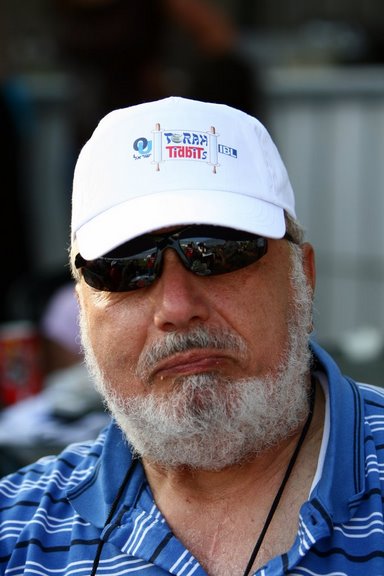

FANS—Yehuda Boltshauser
trained his camera on some fans at the Modi'in-Ra'anana game on
Wednesday
With
help of Modi'in, Bet Shemesh widens lead over Tel Aviv
By Nathaniel Edelstein
GEZER, Israel—The Modi'in Miracle hosted the Ra'anana Express in
Wednesday's doubleheader, winning both games at Kibbutz
Gezer by scores of 5-0 and 8-5.
Australian lefty Matt Bennett dominated the first game with six
innings of work, allowing no runs on just one hit while striking out
eleven and walking three. Catcher Steve Litvack added a two-run
homerun in the fourth inning, his fourth long ball of the year.
In the second game, Ra'anana was leading 3-2 through 5.5 innings,
but Modi'in came back in a big way in the sixth. Jerusalem native
Moish Lewis drove a line drive to center that brought in two runs
and began a six-run rally thanks in part to consecutive singles by
first baseman Aaron Levin and designated hitter Eladio Rodriguez.
Express centerfielder Matt Castillo of Phoenix, Arizona went 2-for-4
with three RBI, but it wasn't enough as manager Art Shamsky's club
extended its winning streak to four games.
At Yarkon Field at the Baptist Village, the host Petach Tikva
Pioneers led the Tel Aviv Lightning 5-0 through three innings, but
the Lightning struck back to win 12-5. The Pioneers' early lead
came with the help of a two-run homer from first baseman Alper
Ulutas in the third.
But from that point on Tel Aviv took control of the game to score
three runs in the fourth when Dominican shortstop Raul Franco stole
home and centerfielder Bryan Langbord hit an RBI-double. The
Lightning tied the game in the fifth inning when Franco hit a
two-run single and Petach Tikva pitcher Andrew Morales walked in the
go-ahead run as Tel Aviv scored five more in the seven to remain 2.5
games out
of first place.
The game at Tel Aviv's Sportek complex between the Bet Shemesh Blue
Sox and Netanya Tigers was called after six innings due to darkness,
but it was enough to declare a definitive winner as the Sox won
14-3. Rafael Bergstrom of Sacramento, California, picked up his
league leading sixth victory, tossing five innings and giving up two
earned runs on six hits with five strikeouts and two walks.
Bergstrom also leads the league with a
2.02 ERA.
He got plenty of offensive support as shortstop Gregg Raymundo
raised his league leading average to .557 by going 2-for-3 with his
tenth homer and four RBI. First baseman Johnny Lopez pitched in
with a 2-for-3 night and is now tied for the league lead in homeruns
by hitting his 13th of the season. Leftfielder Mike Lyons added his
second IBL homerun and three RBI as the Blue Sox extended their win
streak to five games.
Summaries:
1
2 3 4 5 6 7 R H E
Ra'anana 0 0 0 0 0 0 0 0 1 2
Modi'in 3 0 0 2 0 0 x 5 5 1
W: Matt Bennett (5-1); L: John Thew (2-3); HR: Steve Litvack (4)
1 2 3 4 5 6 7 R H E
Ra'anana 0 0 1 0 2 0 2 5 8 3
Modi'in 1 1 0 0 0 6 x 8 8 1
W: Craig Eagle (3-3); L: Daniel Maddy-Weitzman (0-1); SV: Eladio
Rodriguez (2); HR: None.
1 2 3 4 5 6 7 R H
E
Tel Aviv 0 0 0 3 4 0 5 12 8 2
Petach Tikva 2 1 2 0 0 0 0 5 9 5
W: Jason Bonder (1-1); L: Andrew Morales (1-4); HR: Alper Ulutas (2)
1 2 3 4 5 6 R H E
Bet Shemesh 0 3 3 0 5 3 14 12 4
Netanya 1 1 0 1 0 0 3 6 2
W: Rafael Bergstrom (6-1); L: Justin Prinstein (1-4); HR: Mike Lyons
(2), Gregg Raymundo (10), Johnny Lopez (13)
Standings:
Team W L % GB
Bet Shemesh Blue Sox 21 7 .750 –
Tel Aviv Lightning 18 9 .667 2.5
Modi'in Miracle 18 10 .643 3.0
Netanya Tigers 10 16 .385 10.0
Ra'anana Express 10 18 .357 11.0
Petach Tikva Pioneers 5 22 .185 15.5
Thursday at 5 pm the first-place Bet Shemesh Blue Sox host the
second-place Tel Aviv Lightning at Kibbutz Gezer while the Modi'in
Miracle visit the Netanya Tigers at Sportek in Tel Aviv. At 7 pm
the Petach Tikva Pioneers play the Ra'anana Express at Yarkon Field
atthe Baptist Village. For directions to the fields visit
http://www.israelbaseballleague.com/tickets/directions/.
(Return to top)

{Marc Kligman, who combines being
a sports agent with his life as an observant Jew, invites you to listen.
Click on the ad above for more information}
to be a fascinating leap back into time
By Merle Fischlowitz
SAN DIEGO—I recently had my second visit to the "Journey to the Copper Age" exhibit at the San Diego Museum of Man. What a fascinating experience this has been! Not only is there copper on exhibit, but there are also several objects in pottery and fabric. Not only are there utilitarian objects, but the true treasures of the exhibit are the several metal, fabric, and pottery objects created, so long ago, obviously for decorative and ritual purposes.
The first examples of early copper metallurgy, over 6,000 years old, and the explanations of how they were discovered, set me to wondering about the people who created these items.
What people, 6,500 years ago, were so organized in their lives that there were craftsmen who could smelt copper ore to make scepters, maces, candle holders, and other beautiful objects for ritual use?
Who were the craftsmen? Who were the chiefs of the tribes? Who determined the rituals in their lives, and were they set apart in a special priestly class? How did these people produce surplus food, particularly in the semi-arid conditions of what is now modern day Israel, to support a group of artisans and priests? What were the ceremonies in which these ritual objects were used.
As there are early clay ossuaries, small containers for human skeletal remains, what were the practices of caring for the deceased? What beliefs did they have about the afterlife to cause them to save the bones, reduced from skeletons to smaller size, in special decorated containers?
I did not find the answers to my questions in my Journey to the Copper Age. But I did find my mind growing in wonder at our early Human History!
(Return to top)
Rice and Livni ...
QUESTION: And a question
to Minister Livni, if I may. Will Israel agree to discuss the issues
of the refugees, borders, Jerusalem in the meetings and in this
meeting?
FOREIGN MINISTER LIVNI:
As I said before, there is an opportunity here to discuss with the
-- Mahmoud Abbas and the Palestinian government. And I believe that
there's a need to find the widest common denominator between both
sides. And there is an opportunity here, but I'm now going, of
course, now to deal what's going to be the only agenda. But
basically it's very important to put on the table things which are
significant for both sides. But of course, there is a need also to
promote a process that will be based on an understanding that we
want to achieve something and will (inaudible) coming out of these
kind of meetings and sometimes the most sensitive issue, sometime
it's not wise to put the most sensitive issue out first.
QUESTION: This is a
question for Secretary Rice. How can you move ahead with discussing
with each Palestinian state where the Palestinian territories are
divided?
SECRETARY RICE: Well,
first of all, there is a legitimate President of the Palestinian
people, Mahmoud Abbas. There is a government that everybody is
working with and that recognizes Abbas. President Abbas is, of
course, also the chairman of the PLO. And ultimately the Palestinian
people will have to choose what kind of world they will live in,
what kind of state they will have. But as Minister Livni said, we do
have in the Palestinian territories a government that is devoted to
the international principles, the foundational principles for peace
and this is an opportunity that should not be missed. It's very
clear that what happened in Gaza was against the legitimate
institutions of the Palestinian people, the Palestinian Authority.
We are
not going to abandon the people of Gaza to Hamas. In fact, our
efforts to make certain that humanitarian assistance can get to Gaza
will continue and, as need be, intensified because we know that
there are a lot of innocent Palestinians who are living in Gaza
under these conditions. But this is a time for opportunity. I think
it's a time to seize opportunities. I think it is a time to proceed
in a prepared and careful way because one does not want to miss
opportunities by a lack of preparation. But it is nonetheless a time
when I think we have to take advantage of what is the course.
FOREIGN MINISTER LIVNI:
If I can add, I believe that the implementation now of any kind of
understanding between Israel and the Palestinian government can be
in accordance to the places of the territories in which there is an
effective government which, of course, adopt and accept not only the
requirements of the international community, but the basic
understanding with Israel. And I believe that it is for the
Palestinians to choose what kind of future they want to reach or
what kind of hope they want to send to their own children. And I
believe that this can be also an example working with the new
government in places in which they have control.
SECRETARY RICE: Thank
you.
FOREIGN MINISTER LIVNI:
Thank you. Thanks.
(Continued from above)
__________________
Rice, Gates and Saud ...
You have covered very well the agenda that we have been dealing with here. It’s obviously an agenda that we deal with from a common view of many of the challenges that face us here in the region. I will not elaborate because you have gone through the agenda, but let me just take this opportunity to say that we are delighted that there was a Security Council resolution yesterday passed on Darfur. It was passed unanimously for the deployment of a peacekeeping force that we hope will bring an end to the suffering of the people of Darfur. We are expecting the Sudanese Government to live up to the commitments that it has undertaken, and we look forward also to the efforts that the Secretary General is making for the peace between the factions in Darfur and in Sudan. And I just want to note that Saudi Arabia played a very important and positive role in helping to bring about that resolution, so thank you very much for that.
SECRETARY GATES: I would just comment briefly that we had excellent conversations on a range of security issues and challenges in the region, particularly in the Persian Gulf. We obviously also discussed Lebanon and other issues. We explored the possibility for further closer partnerships in security. We will have further conversations this morning in that regard.
We look forward to continuing these conversations with our friends here in Saudi Arabia, both this morning and in the future. Thank you.
FOREIGN MINISTER SAUD: If you’ll choose the American.
SECRETARY RICE: All right, that sounds fair. All right. Anne Gearan, please.
QUESTION: For the Foreign Minister. Can you respond to Ambassador Khalilzad’s remarks the other day to the effect that Saudi Arabia has not done enough to assist the Maliki government in Iraq? Do you have confidence in that government?
And also, did you discuss the upcoming plans for a Mideast peace conference, and under what conditions would you attend that conference?
FOREIGN MINISTER SAUD: Two separate questions, and one of them is allowed. But for the support of the government, we just had a mission from Iraq in Saudi Arabia where we talked about security and where we decided that we will send a mission to Iraq to see how we can start our embassy in Iraq. And so that aspect of it is well on the way to being resolved to the satisfaction of both governments.
We expressed the hope that we can work as closely with the Iraqi Government on security measures, especially dealing with terrorist activity, as we have achieved with the United States and with other friendly governments. And they promised that they would cooperate and coordinate with us in this regard.
And as I said, as a sign of good gesture, we also let them beat our soccer team in the final round. (Laughter.)
And on the other issue, on the peace conference, I said before that we are interested in a peace conference to deal with the substantive matter of peace, the issues of real substance and not form or non-substantive issues. If that does so, it becomes of great interest for Saudi Arabia. And should we then get an invitation from the Secretary to attend that conference, we will look very closely and very hard at attending.
QUESTION: (In Arabic) This is a question from Reuters TV. Dr. Rice, you have said before that America gives military support to the nine countries, but not for war. What are you giving support for? Mr. Gates, what kind of support do these nine countries have to give to the U.S., and why do Democrats insist on a timeframe for pulling out of Iraq? Your Highness, what kind of cooperation have you been asked to give America and its presence in the region? Does this meeting about military indicate an international crisis?
SECRETARY RICE: I might note I think that the translation was not coming through to the American press corps, so let me just say that the question to me was about the support that we – the military support, security support to the nine nations of the Gulf, and if it is not for war, what is it for.
And I would say that it is to secure the peace. We have with our allies in this region for decades been committed to a peaceful Gulf. We have had security cooperation with Saudi Arabia that goes back for decades, with other Gulf states that goes back for decades. With Egypt, we have just come to an end of a ten-year program on security cooperation. So there is nothing new here. The challenges may be different. In some ways, the challenges may be more acute, more – it may be a more challenging environment. But this is a very long-time and long-term security relationship in which we’ve been engaged.
SECRETARY GATES: I think the question that – two-part question that came to me was what kind of assistance are we providing to the nine countries of the Gulf, and then there was a second question in terms of domestic opposition in the United States to our presence, continuing military presence in Iraq.
With respect to the first, we’ve had ongoing bilateral security relationships with most of the countries in the Gulf for decades. Those assistance programs are tailored to the needs of each of those countries and their perceptions of their own security requirements. One of the purposes of my coming on this trip was to explore with each of our friends whether there were further opportunities for cooperation and enhancing those security relationships as we look forward.
In terms of opposition in the United States to the war, the reality is that the United States has been at war in Iraq for over four years. We have suffered just over 3,000 American soldiers killed in battle, several tens of thousands wounded. This is very painful for the American people. I think that there is a concern, has been a concern, at the slow pace with which the Iraqi political leadership has approached reconciliation while these sacrifices were being made.
By the same token, I think that there is an appreciation that the United States must not take any action as we look forward that is significantly – that is destabilizing here in this region. And I am confident that the President will take into account in any decisions he makes with respect to Iraq the long-term stability of the region.
FOREIGN MINISTER SAUD: (In Arabic) When the Kingdom gets weapons, it gets them to defend itself. The Kingdom has never been known to be a belligerent or aggressive country. That is why we are arming. I don’t think any one of us in this room doubts the threats in the region and the turmoil that it is in. Therefore, whatever protects the Saudi nation and Saudi interests, the government has to take measures about it. I hope the reporters ask one question, and not three at a time.
QUESTION: In English, please?
SECRETARY RICE: Would you mind just saying in English what you just said? They didn’t – they couldn’t get a translation.
FOREIGN MINISTER SAUD: I said that Saudi Arabia is a peaceful country. It is a peaceful country in an area of tremendous threat and upheaval, and so it is not strange that it is trying to acquire a posture of defense that will protect the interests of and safety of the people of Saudi Arabia. And I asked the reporters to ask one question at a time instead of three questions.
QUESTION: Another question for the Minister following up on the earlier question. I’ll try to make it one question.
Sir, is the Maliki government sufficiently protective of all groups in Iraq, including Sunnis? And is there any – are there any steps the Saudi Arabian Government is – new steps the Saudi Arabian Government is planning to take, such as on border controls, improving border controls, in recent – in the next few months that will help stabilize the situation in Iraq?
FOREIGN MINISTER SAUD: All that we can do in order to protect the border between us and Iraq we have been doing. I think what is needed for action is on the other side, and we have been in touch with our friends from the United States also for increasing the protection on the other side.
The traffic of terrorists, I can assure you, is more on this side coming to us from Iraq than going from us to Iraq. And this is one of the ways that our government has embassies, why we ask for cooperation and coordination between us and the security forces of Iraq.
QUESTION: Could you address whether the Maliki government is sufficiently protective of Sunnis in Iraq?
FOREIGN MINISTER SAUD: Well, it is up to the Iraqi people to decide. I don’t know. We, for our part, keep the same distance from all factions and whether they’re Sunnis or Shia, we perceive them only as Iraqis and we cooperate with anybody who is working for the unity and territorial integrity of Iraq.
QUESTION: (In Arabic) This is a question for the Foreign Minister. You always talk about the good relations between the two countries. Every now and then we see some verbal attacks or criticism against the Kingdom, beginning with what Zalmay Khalilzaid has said and what the Congress has said. Does Saudi Arabia want to see how strong these relations are?
FOREIGN MINISTER SAUD: (In Arabic.) Actually “good relations” doesn’t mean that there are not any differences over certain issues. But “good and healthy” relations must contain some differences of opinion over some issues. The proof of the health of the relations is that these issues are discussed sincerely and transparently. As for Khalilzad’s statements, I was astonished at them. He was in the region, and we have not heard from him any criticism against the Kingdom’s actions before. So, my comment is this: he must have been influenced by the atmosphere at the UN.
QUESTION: In English, please?
FOREIGN MINISTER SAUD: I said about the statements made by Ambassador Khalilzad that I was astounded by what he said, especially since we had never heard from him these criticism when he was here. And as ascribed that to perhaps his being in the United Nations and in New York and away from Iraq.
SECRETARY RICE: Oh, I’m sorry, I didn’t know that the question was also to me.
I completely subscribe to what the Minister said. We are good friends. We are allies. We have been so for decades. It doesn’t mean that there won’t be disagreements about policy, tactics, from time to time. But the fact is that this is a relationship that allows us to discuss the most difficult and most sensitive issues in a way that is respectful and friendly. If there are problems that the United States has with Saudi policy, we talk about it. If there are problems that Saudi Arabia has with American policy, we talk about it. And that is what is befitting a relationship of our breadth and depth.
And I have said too that Saudi Arabia is a member of a group of the neighbors that have agreed on a course of action in supporting the unified and stable and democratic Iraq, and we all have our obligations to carry out and we are in the process of carrying them out.
And I just want to very much thank the Minister for something that he said, which is that they are now exploring with Iraq how to put a diplomatic mission in Iraq. This is something that we have encouraged. We believe that it is an important step because normal relations between Iraq and its neighbors is extremely important in affirming its identity in this part of the world. And so thank you very much for that, and we will try and assist in any way that we can. Thank you.
Are we done? I think that was four.
FOREIGN MINISTER SAUD: We’ll take one more.
SECRETARY RICE: Oh, we’re going to take one more questions? Oh, all right.
QUESTION: (In Arabic) Your Highness, you have discussed a Saudi diplomatic mission to Iraq to explore the chances of reopening the Saudi Embassy in Baghdad. Would you talk to us about the nature of this commission and when they will arrive in Iraq? Is it connected to launching a peace initiative?
FOREIGN MINISTER SAUD: (In Arabic) No, it’s only about bilateral relations between Iraq and the Kingdom. It will contain diplomats, of course, from the Ministry of Foreign Affairs. I will keep the date of their arrival as a secret for now. It is not connected to the peace process.
QUESTION: In English, sir?
FOREIGN MINISTER SAUD: In English. He was asking about the mission that will go to Iraq to open the embassy, what kind of mission it is going to be and when it is going to leave and arrive in Baghdad. So I told him that it will be a diplomatic mission from the Ministry of Foreign Affairs, but as to the date of departure and arrival we shall keep that a secret.
SECRETARY RICE: Last question? Should we take –
FOREIGN MINISTER SAUD: Last question.
SECRETARY RICE: Warren. Warren Strobel.
QUESTION: A question for the Foreign Minister. Several months ago, King Abdullah described the American military presence in Iraq as an illegal occupation. Is that still the Saudi position? And at this point, would you like to see the beginnings of a staged American withdrawal from Iraq, or do you fear that that would lead to greater instability and more terrorism coming across your borders? Thank you.
FOREIGN MINISTER SAUD: I have made a promise to myself never to comment on the statements of my monarch, so I am not going to do that.
As to the issue of withdrawal, that is completely up to the Iraqi people and the United States Government.
Thank you.
SECRETARY
RICE: Thank you.
Israeli women in combat...
(Continued from above)
The Karakal Battalion, a unit composed of all the Karakal companies which predated it, is currently celebrating the third year since its founding. Both genders go through a trying basic training period of four months where they go through an arduous physical training regimen, with everything else that can be expected from a military course such as this. The training includes camouflage paints, and various firearms. This all takes place at the Givati Brigade training base. Throughout the months of training, the soldiers specialize in weapons such as machine guns, advanced weaponry, grenades, mortars, etc. The next phase will be the advanced training, together with studying their future sector of operations.
The general perception of Karakal, that it does not post females on the forefront in battle, is something that Lieutenant Kortzki would like to contradict. You might say she gives it an outright 'negative'. "What if they don’t fall into our arms? We will go out and attack, because that is what we train for, and know how to do." She herself was part of a 16 hour chase which brought about the arrest of two wanted terrorists. It began when they discovered footprints, followed by a patrol of the area, led by one of the main scouts in the south of israel. Just like in basic and advanced training, and in routine guard duty, both the males and the females shared the work equally. No compromises. Operations test the basic principles of the battalion; combat camaraderie between the genders. Part of the conditions of equality is the fact that all of the combat soldiers of the battalion serve for three years in the military.
This concept also exists in the Nachshol Battalion of the Field Intelligence Corps, which also operates in southern Israel. Unlike Karakal, the battalion itself is not co-ed. The girls, who are Intelligence gathering combatants, are trained at the 03 training level (non-infantry), and as part of their classified service, they learn how to operate advanced scouting and observation equipment. Their service differs from regular Intelligence gathering in that they gather their information from the field. They gather their information for operations in the field while in the field, not from a command center.
The formation of the battalion at the beginning of the year is a direct indicator of the release of administrative and professional restrictions in the IDF. In the past decade, various positions have been opened to women, such as anti-aircraft combat positions, combatants in the Artillery Corps, combat soldiers in the "Oketz" elite canine unit, ABC warfare soldiers, Border Police soldiers, telecommunications, parachuting instructors, and of course-pilots. "The element of quick, sharp thought, together with the physical effort which the female combat soldiers are demanded to display at any given moment," stresses Captain Shirli, the commander of the Nachshol Battalion, which has accompanied her since the beginning of the year, when it was founded, "is what attracts girls to come to the Field Intelligence Corps." She sees a special quality in the atmosphere the female combat soldier brings to the field. It is something that is difficult to put your finger on, it may just be that 'woman's touch.' Captain D', a former company commander in the Sahlav unit, agrees. He admitted that, "the female combat soldiers are cooler and more calculating than the boys, they are calmer, and hold their weapons in a professional manner. If I have to send a girl to arrest a female terrorist, I have no problem with that. I believe in the female combatants in the company one hundred percent."
From pigeons to airplanes
In the first days of the IDF, ten women were drafted for a unique position- pigeon handling in the postal pigeon unit. They would continue the position which they occupied in the Hagana. There, they were the authority in anything pertaining to caring for the pigeons. This included training them for duty, and sending them off on their important missions, delivering messages to various far away destinations. They were known as the "Pigeon Trainers." In 1945, a slightly larger group of women was gathered for this purpose, an extremely classified position at the time. The girls trained the pigeons for approximately three months, at the end of which they would serve as a means of communication with besieged settlements. As the IDF was founded and women were drafted, these girls maintained their position as pigeon trainers, and continued to do so as reservists.
If we look even further back in time, at the years before the establishment of the IDF, military service for women existed in the lines of the "Shomer' and "Hagana" organizations. The "Hagana" stated in its law that its lines were open to: "Every Jewish male or female, who is prepared and trained to fulfill the obligation of national defense." Most served as medics, communications specialists, and weaponeers. During WWII approximately 4,000 females volunteered for service in the British assisting forces. One of them, Alice Hatzor-Hirsch, was about 16 when she joined the Hagana. In 1942, she joined the British army-as a driver. "We were more connected than the others," she recalled years later. "A girl becoming a driver in the British army was considered the height of boldness at the time."
In Tel-Aviv of the 1940's, a battalion was established in which women filled positions in security, weapons transport, and manned anti-aircraft posts. "The Combat Girls Battalion" was established in Haifa a year later. In the winter of 1948, the time in which the War of Independence was waged, women joined the combat soldiers of the Palmach, who traveled from Tel Aviv to Jerusalem with their weapons concealed in their clothes. The Palmach arm (thirty percent of which were females) trained nine female platoon commanders, and other female squad commanders.
Years before joining the IAF Flight School was the dream of aerospace enthusiasts, and the symbol of the struggle for equal rights, in May of 1940 Rachel Markovski received her Pilot's license. She became a pioneer as the first female pilot. Another pioneer was Hava Inbar, a lawyer, who was appointed the judge of the military court in Haifa in September of 1969, thus becoming the first female military judge in the world. "I do not know if I want to be a military judge my whole life," she said in an interview, "but I am glad that I was appointed; it proves that the IDF leaves almost all doors open for its female soldiers."
Miller's revolution
Women now amount to 26 percent of all officers in the IDF, reaching the ranks of lieutenant colonel, colonel, and brigadier general. 88 percent of all military positions are available to women.
The wide range of opportunities available is thanks to a number of
milestones along the way. In the Yom Kippur War, when men were sent
to the front, the training positions for field units were opened to
women out of necessity. Alice Miller's appeal to the Supreme Court
regarding the fact that the IAF Flight School was no longer an
option for women brought about one of the most substantial events in
the history of the IDF. Since 1995, the course has been open to both
genders. Miller, coincidentally, did not ultimately pass all of the
assessments of the military- "and it was for the best," as she
explained ten years later. "I was exhausted by the whole ordeal, the
public exposure that I had at the time. Dealing with that was far
from easy. For two years I held onto the flag, I was forced to
defend the honor of women whenever I walked in the street. The
military's approach towards women is changing for the better," she
added, "and the more they become part of specializations that are
not conventional, their position in the IDF will become stronger."
Five years after the revolutionary judgment, the law of military
service as of 1949 was amended. It stated that equality would be
maintained throughout the military, except in such areas where
certain issues precluded this, such as physical restrictions. In
2000, medical studies proved that women would not be physically able
to undergo the requirements needed for the training of the Air Force
669 Special Forces unit. However, the closing of that unit to women
brought about a positive promise-it opened the option of an airborne
combat medical position. As the female airborne medics bore witness
as they returned from Lebanon, this was a decision of much
importance, which proved itself in the field.
The preceding story was provided by the Israel Defense Force



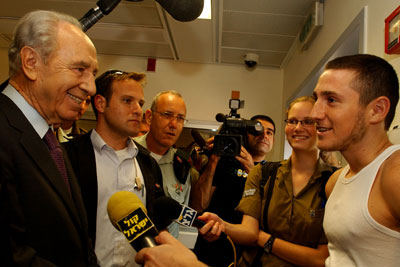



 News Sleuths:
News Sleuths:
 The
foremost environmentally friendly packaging company, Bubbla,
seeks sales personnel throughout the three-state area to
demonstrate and sell its packaging systems. We offer sales
assistance, payment for pre-qualified customer demonstrations
and a high commission structure for independent representatives.
To find out more, email us at
The
foremost environmentally friendly packaging company, Bubbla,
seeks sales personnel throughout the three-state area to
demonstrate and sell its packaging systems. We offer sales
assistance, payment for pre-qualified customer demonstrations
and a high commission structure for independent representatives.
To find out more, email us at